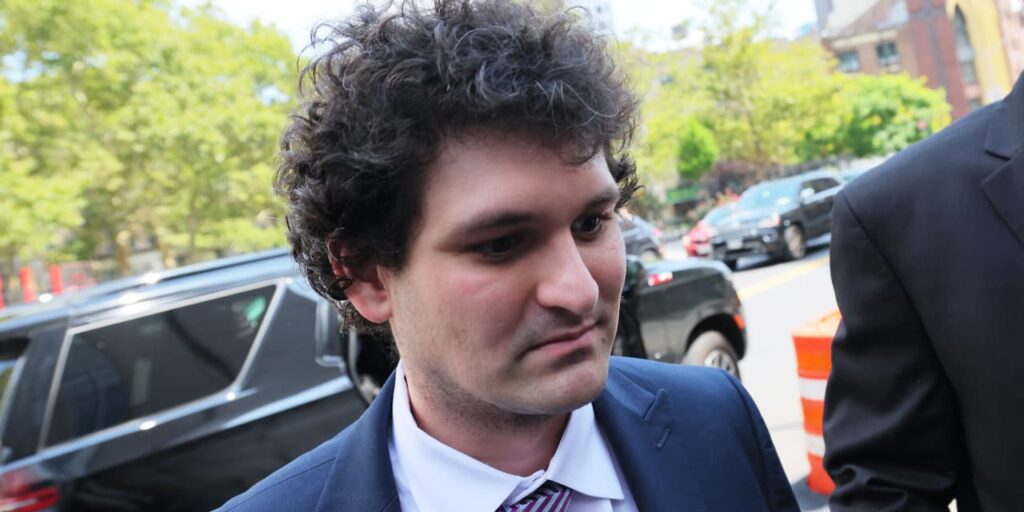A guilty verdict for FTX founder Sam Bankman-Fried closes a chapter on the industry’s biggest fraud, but it may only heighten pressure on Washington to ensure it doesn’t happen again.
Bankman-Fried’s guilty verdict came swiftly on Thursday after the jury deliberated for only a few hours, convicting him on all seven charges of fraud and conspiracy, including money laundering, securities fraud, and wire fraud. Bankman-Fried is expected to appeal. If the convictions are upheld, he could face more than 100 years in prison.
The conviction marks a victory for federal prosecutors and efforts to crack down on crypto fraud. It may also come as a relief to the crypto industry, which has long argued that the FTX fraud—wiping out billions of dollars in investments—was a one-off incident that shouldn’t tarnish the broader industry.
The trial ended without major revelations that would affect crypto prices. Indeed, Bitcoin has rebounded sharply this year, more than doubling to about $34,900. Its price has been bolstered by interest in the likely launch of a Bitcoin exchange-traded fund, which some analysts believe will lure billions of dollars from institutions sitting on the sidelines. The value of the crypto market sank below $800 billion in January, according to CoinMarketCap, but now trades above $1.2 trillion.
Since FTX collapsed in November 2022, industry executives have argued that Bankman-Fried’s actions amounted to a run-of-the-mill fraud rather than something endemic to cryptocurrency. Prosecutors said the executive used customer funds to buy property in the Bahamas, make political donations and prop up his affiliated trading firm, among other offenses.
While the market has recovered, regulators and some lawmakers continue to argue that the industry needs much stiffer enforcement. But unlike the Enron scandal, which spawned a wave of new accounting and disclosure rules, many lawmakers this time say regulators have all the legal authorities they need to go after crypto companies. The Securities and Exchange Commission under Chair Gary Gensler has led the crackdown.
That’s dismayed the crypto industry, which has argued Congress needs to pass bills to create a clear path to operating their businesses legally. Passing comprehensive legislation in Washington is proving tough across the board. But the mood in Washington has shifted sharply from fostering the industry’s growth to cracking down on it.
Before FTX’s collapse last year, senators were far along in the process of passing a bill that would shield much of the industry from securities laws—providing “safe harbors” to crypto. Some lawmakers are still pushing the effort, but policy analysts don’t expect it to move forward for years.
The House Financial Services Committee this summer advanced a bill that would have a similar impact. But thus far its sister committee in the Senate hasn’t even taken it up, let alone agreed on a path forward that would satisfy both Republicans and Democrats.
Lawmakers continue to take in campaign contributions from the industry, which is lobbying hard on a variety of fronts. Yet some of the most crypto-friendly lawmakers are now urging regulators to crack down on purported bad actors. The recent terrorist attack by Hamas, which was reportedly funded in part with crypto, has added fuel to the fire.
In late October, Sen. Cynthia Lummis (R., Wyo.) and Rep. French Hill (R., Ark.), who are considered industry proponents, sent a letter to Attorney General Merrick Garland saying that the lawmakers “strongly support swift action by the Department of Justice against Binance and Tether to choke off sources of funding to the terrorists currently targeting Israel.”
Binance didn’t respond to a request for comment. Tether pointed to a statement from October where it criticized media reports as misrepresenting crypto’s use in terrorist financing and said the company “is uncompromising in its adherence to regulatory compliance and due diligence.”
Lummis and other lawmakers are still pushing bills that the industry supports. But they haven’t been able to gain the foothold needed to curb the powers of regulators like Gensler.
“We’ve seen this story before. It’s reminiscent of what we had in the 1920s before the federal securities laws were put in place,” Gensler said in a speech to securities lawyers in late October. “This is a field rife with fraud, scams, bankruptcies, and money laundering.”
Crypto companies also remain regulatory targets. The SEC this summer sued
Coinbase Global
(ticker: COIN) and Binance—the world’s largest crypto exchange—accusing the companies of operating as unregistered securities exchanges. The companies are fighting those charges in court. One analyst has said regulatory issues could threaten more than a third of Coinbase’s revenues.
FTX’s collapse might be crypto’s most scandalous moment so far, but many companies’ existential moments are still to come.
Write to Joe Light at joe.light@barrons.com
Read the full article here

